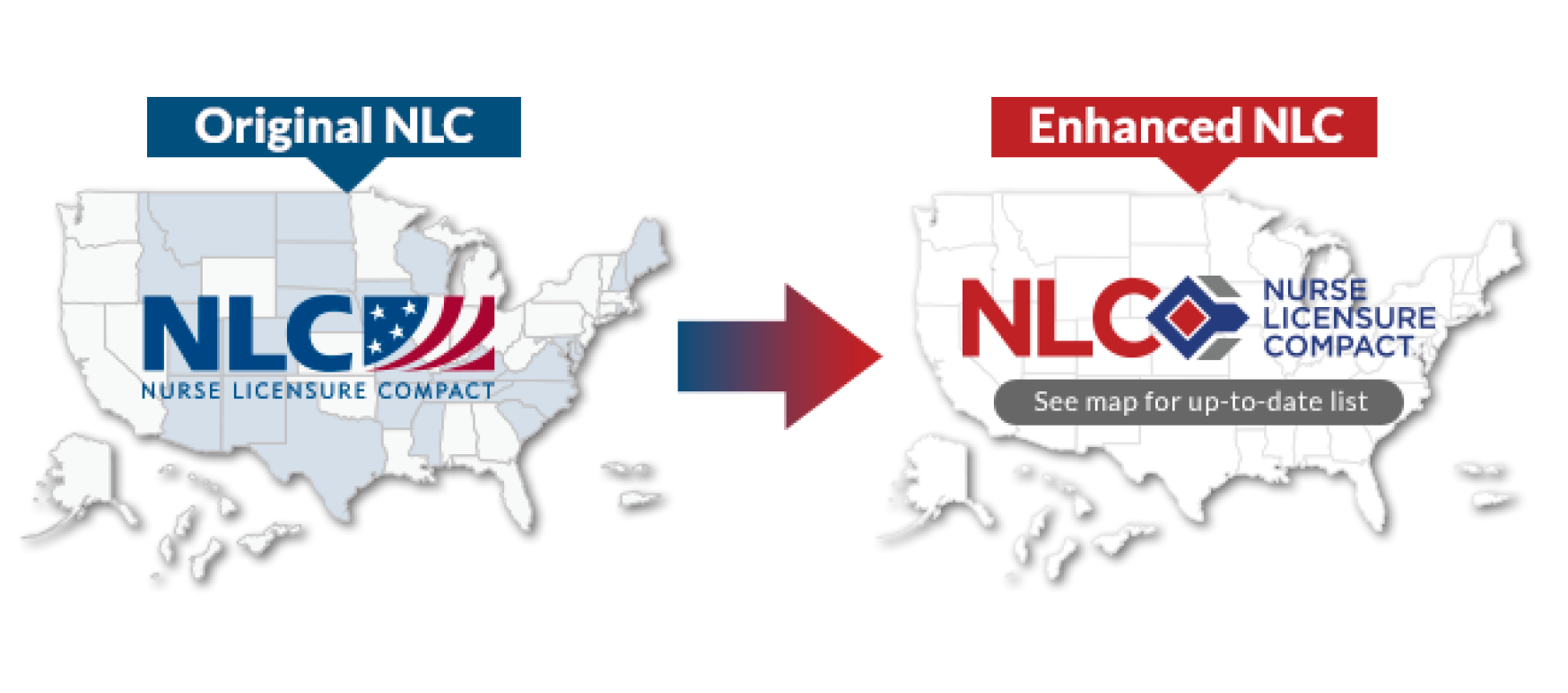The Nursing Licensure Compact (NLC) is an agreement among certain states which allows nurses to practice in all member states by holding a single compact state nursing license. The states involved in the agreement are known as compact nursing states.
Historically, licensure for healthcare professionals has been required in multiple jurisdictions if their practice crossed state or territorial lines. This changed in 2000, when the NLC was introduced in Maryland. Under the NLC, registered nurses (RNs) and licensed practical/vocational nurses (LPN/LVNs) can hold one license, issued by their primary state of residence, and practice in other compact states without having to secure another license.
Understanding which states are members of the NLC can help you determine whether you’re legally able to practice in neighboring states and other territories. While legislation continues to evolve, here’s a quick look into where the NLC currently stands across the U.S.
Which states are currently Compact Nursing States?
By 2015, the NLC had grown to include 25 states. In 2018, the Enhanced Nursing Licensure Compact (eNLC) was developed to incorporate standards for licensure which the original compact did not include. For instance, the eNLC now requires applicants to undergo fingerprint criminal background checks at the state and federal level, whereas the previous compact did not.
As of August 2022, there are currently 39 states and territories that are part of the eNLC:
- Alabama
- Arizona
- Arkansas
- Colorado
- Delaware
- Florida
- Georgia
- Guam (This territory allows nurses who hold active, unencumbered, multi-state licenses issued by NLC member states to practice in Guam under their multi-state licenses.)
- Idaho
- Indiana
- Iowa
- Kansas
- Kentucky
- Louisiana (Registered Nurse and Practical Nurse)
- Maine
- Maryland
- Mississippi
- Missouri
- Montana
- Nebraska
- New Hampshire
- New Jersey
- New Mexico
- North Carolina
- North Dakota
- Ohio (Law passed; implementation date 1/1/2023)
- Oklahoma
- Pennsylvania (Law passed; awaiting implementation)
- South Carolina
- South Dakota
- Tennessee
- Texas
- Utah
- Vermont
- Virginia
- Virgin Islands (Law passed; awaiting implementation)
- West Virginia (Registered Nurse and Practical Nurse)
- Wisconsin
- Wyoming
In addition, there are several states with pending legislation to implement the eNLC, including Alaska, Illinois, Massachusetts, Michigan, Minnesota, New York, Rhode Island, and Washington.
Some states do not currently support the eNLC and cite concerns such as loss of state revenue for new single state licenses. Nonetheless, for more than 2 million nurses who reside in eNLC states, the ability to practice across state lines opens up many additional opportunities, including the ability to respond to national disasters and staffing shortages and practice telenursing in participating states.
What About the APRN Compact?
While the eNLC exists for RNs, many advocates are also pushing for the APRN Compact. Like the eNLC, the APRN Compact would allow for a multistate license that would allow APRNs to care for patients across state lines. Once seven states have enacted legislation, the APRN Compact can take effect. As of August 2022, Maryland and New York had pending APRN Compact legislation, while Utah and North Dakota have enacted legislation.
As laws for NPs continue to evolve, continue to check the websites for the Nurse Licensure Compact and the APRN Compact for updates for your state.
If you’re an NNP seeking work, allow our specialists to help you make informed decisions about your career. From relocation support to Locum Tenens placement, our team can help find the employment options that fit your wants and needs. Get started with a free career consultation.

